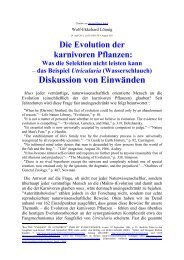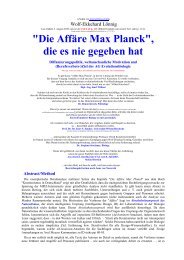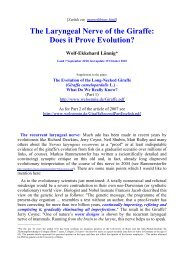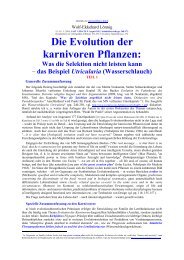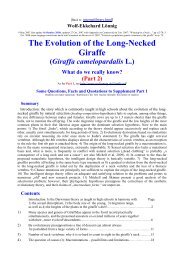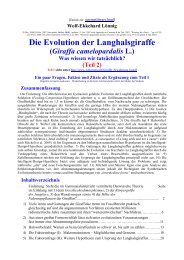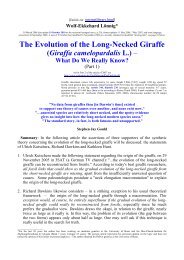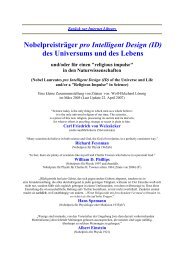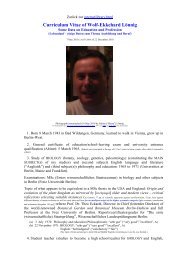Die Affäre Max Planck - Wolf-Ekkehard Lönnig
Die Affäre Max Planck - Wolf-Ekkehard Lönnig
Die Affäre Max Planck - Wolf-Ekkehard Lönnig
Erfolgreiche ePaper selbst erstellen
Machen Sie aus Ihren PDF Publikationen ein blätterbares Flipbook mit unserer einzigartigen Google optimierten e-Paper Software.
51<br />
Second Law auf dem Instituts-Server http://www.math.utep.edu/Faculty/sewell/articles/article.html und<br />
Appendix D: Can ANYTHING Happen in an Open System? seines Buchs The<br />
Numerical Solution of Ordinaty and Partial Differential Equations, John Wiley &<br />
Sons (http://www.math.utep.edu/Faculty/sewell/articles/appendixd.pdf). Aus seinem Beitrag "A Second<br />
Look..." hier nur ein kurzer Auszug (er setzt sich auch in diesem Essay für den<br />
intelligenten Ursprung des Universums und des Lebens ein):<br />
"Science has been so successful in explaining natural phenomena that the modern scientist is convinced that it<br />
can explain everything, and anything that doesn't fit into this model is simply ignored. It doesn't matter that there<br />
were no natural causes before Nature came into existence, so he cannot hope to ever explain the sudden creation of<br />
time, space, matter and energy and our universe in the Big Bang. It doesn't matter that quantum mechanics is based<br />
on a "principle of indeterminacy", that tells us that every "natural" phenomenon has a component that is forever<br />
beyond the ability of science to explain or predict, he still insists nothing is beyond the reach of his science. ...<br />
[Nach Hinweis auf den 2. Hauptsatz der Thermodynamik zur Wahrscheinlichkeitsfrage] But one would think that<br />
at least this would be considered an open question, and those who argue that it [the evolution of Life] really is<br />
extremely improbable, and thus contrary to the basic principle underlying the second law, would be given a<br />
measure of respect, and taken seriously by their colleagues, but we aren't.”<br />
Was G. Sewell's Beiträge auf dem offiziellen Server seines Instituts und seiner<br />
Universität anlangt, so liegen hier noch einige wichtige Sperrungsaufgaben für<br />
Herrn Kutschera und Mitarbeiter bereit, ebenso im Falle von Michael J. Behe<br />
(siehe unter http://www.lehigh.edu/~inbios/faculty/behe.html). Beim nächsten Autor, Robert J. Marks<br />
II, haben das allerdings schon andere für sie besorgt.<br />
Robert J. Marks II (Distinguished Professor of Electrical and Computer<br />
Engineering, Baylor University) und William A. Dembski (Research Professor in<br />
Philosophy, Southwestern Seminary) vom Evolutionary Informatics Lab<br />
http://www.evoinfo.org/: Ankündigung 20 January 2009: Two forthcoming peer-reviewed<br />
pro-ID articles in the math/eng literature:<br />
William A. Dembski and Robert J. Marks II (2009): Conservation of<br />
Information in Search: Measuring the Cost of Success (in press).<br />
Abstract: Conservation of information theorems indicate that any search algorithm performs on average as well<br />
as random search without replacement unless it takes advantage of problem-specific information about the search<br />
target or the search-space structure. Combinatorics shows that even a moderately sized search requires problemspecific<br />
information to be successful. Three measures to characterize the information required for successful search<br />
are (1) endogenous information, which measures the difficulty of finding a target using random search; (2)<br />
exogenous information, which measures the difficulty that remains in finding a target once a search takes<br />
advantage of problem-specific information; and (3) active information, which, as the difference between<br />
endogenous and exogenous information, measures the contribution of problem-specific information for<br />
successfully finding a target. This paper develops a methodology based on these information measures to gauge the<br />
effectiveness with which problem-specific information facilitates successful search. It then applies this<br />
methodology to various search tools widely used in evolutionary search.<br />
(P. 1 of pdf draft:) "Such [novel] information does not magically materialize but instead results from the action of<br />
the programmer who prescribes how knowledge about the problem gets folded into the search algorithm.”<br />
William A. Dembski and Robert J. Marks II (2009): The Search for a<br />
Search: Measuring the Information Cost of Higher Level Search (in press).<br />
Abstract: Many searches are needle-in-the-haystack problems, looking for small targets in large spaces. In such<br />
cases, blind search can stand no hope of success. Success, instead, requires an assisted search. But whence the<br />
assistance required for a search to be successful? To pose the question this way suggests that successful searches<br />
do not emerge spontaneously but need themselves to be discovered via a search. The question then naturally arises<br />
whether such a higher-level "search for a search” is any easier than the original search. We prove two results: (1)<br />
The Horizontal No Free Lunch Theorem, which shows that average relative performance of searches never exceeds



